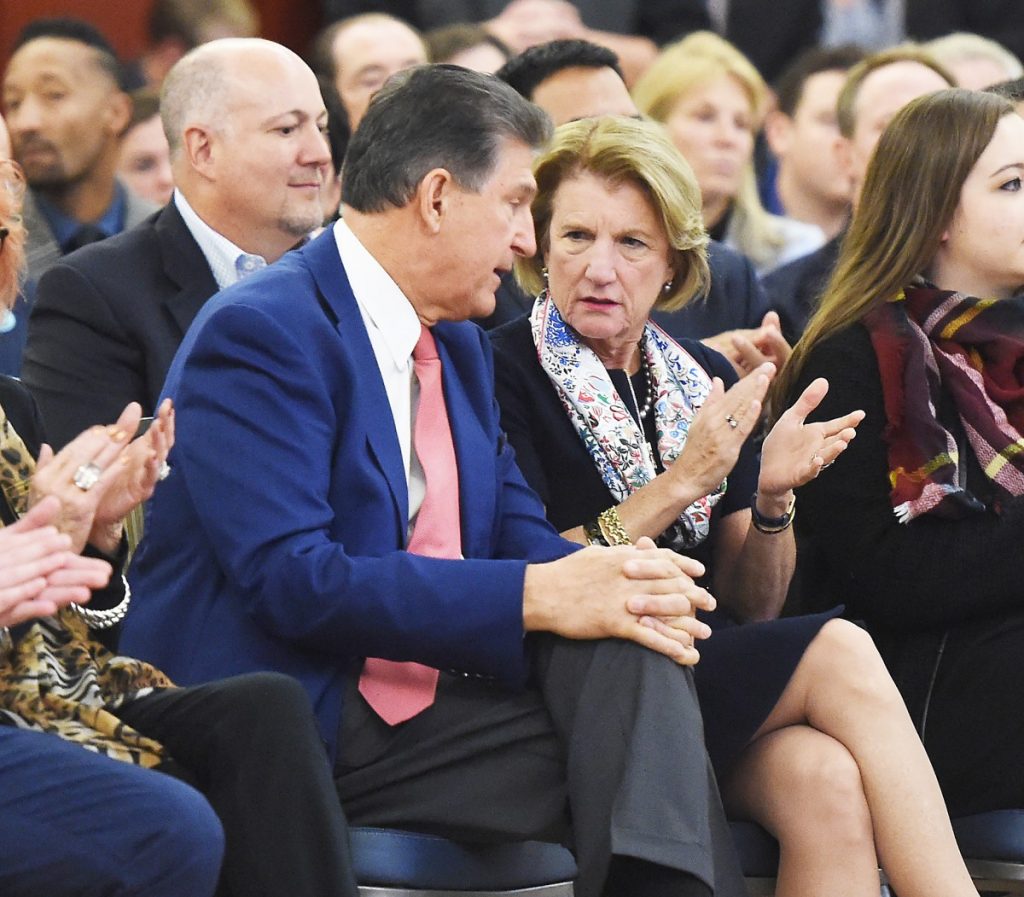MORGANTOWN — Sen. Shelley Moore Capito offered her thoughts Friday on restocking the tapped-out Paycheck Protection Program for small business loans, and a few additional comments on her appointment to the Congressional Economic Task Force for advising the president on reopening the country after the COVID-19 pandemic.
Capito, R-W.Va., held a press conference call on Friday, the day after Sen. Joe Manchin, D-W.Va., held a call on the PPP.
The Small Business Administration approved 5,211 forgivable PPP loans for West Virginia businesses employing less than 500 people, awarding $1.05 billion.
Nationwide, the $350 billion PPP fund provided by the CARES Act was quickly drained and plans to restock it with another $250 billion via a bill dubbed CARES 3.5 are temporarily halted as Republicans and Democrats disagree over adding another $250 billion for other programs.
“I’m very disappointed that this has gotten caught up in politics,” Capito said

The Senate is not scheduled to return to full session until May 4, but has two pro-forma sessions – short meetings Constitutionally required in lieu of adjourning – set for Monday and Thursday and both senators hope that an agreement might be reached so that businesses won’t have to keep waiting for money.
Republicans want to pass a simple $250 billion restock of the PPP,Democrats want to take on another $100 billion for health care and $150 billion for state and local governments. Negotiations are underway.
“I think the sole proprietors and the small-small businesses are the ones getting shut out now because they might not have been ready a week ago,” Capito said. “And the lenders are more familiar with hte program so it could run smoother for those folks.”
Tacking on more money, she said, sounds like an effort to drive some political agenda into a bipartisan program passed overwhelmingly.
“We know the hospitals are going to need more money,” she said, but $70 billion of the original $100 billion in CARES for hospitals and health care remains unspent. “Let’s see where our gaps are with the hospitals before we start saying the money’s money’s going to go here and there in this or that different hospital setting.”
Also, new additions the CARES 3.5 means additional regulations, guidance and time while businesses are waiting.
“If you reopen the doors to the lenders to begin lending again,” she said, small businesses will resume applying for money. She understands that the ones that gobbled up the first round probably had lawyers and accountants working the system, but now shes getting calls from hairdressers and mom-and-pop restaurants.
“In my view the quickest way to do that is to put the money in,” and not spend time regulating how small or how rural a business should be to get a share of a Democrat-proposed carve-out. And if the $250 billion runs out, approve more.
Manchin said Thursday he stands with those who want a carve-out from the package for small rural businesses and hospitals. “Unless we have an offset, it’s going to make it difficult for rural America, rural Appalachia, definitely rural West Virginia to have a fair share. That’s what we’re fighting for.”
Of $30 billion in CARES devoted to health care, he said, about $270 million came to West Virginia, and only $6 million to $7 million went to rural hospitals that can’t make payroll and could close.
“We know the need is there,” he said, “I believe it’s going to take closer to $500 billion for this round that’s going to go out next week. … We need health care money too.”
If small health-care systems fail, he said, it poses a problem even if the overall economy bounces back. “Don’t you think right now it’s just as urgent to make sure that we’re keeping them alive and solvent as … the SBA [is doing with] small business loans.
Manchin and Capito both want to see CARES rules tweaked so that small publicly owned hospitals can also get money.
Restarting America
Trump’s 18-page Opening Up America Again outline was released Thursday. It proposes states rebooting from the pandemic in three stages, at state governors’ discretion, when certain criteria are met. The first two stages include keeping shelter-in-place orders active, and keeping social distancing during the third, return-to-work stage.
But news reports suggest Trump is sending mixed signals. On Friday he fired off three tweets apparently supporting those protesting three Democrat governors’ shelter-in-place orders. “LIBERATE VIRGINIA,” LIBERATE MINNESOTA,” “LIBERATE MICHIGAN,” he tweeted. Other news reports suggest Trump is antsy to get the economy rolling sooner that governors and health experts might deem wise.
Capito suggested Trump wants to do what’s right, as reflected in his plan and the creation of his task force. “I think he’s asking for advice, that’s what he created these councils for. He’s asking for creative ways to reopen.”
The staging of his plan shows a cautious approach, she said. And his tweets and comments are a function of who he is as a person and a business person who’s anxious to get things moving again.
But governors will need assurances, she said.
Capito and Manchin agree on what has to be in place to make sure people are safe before the nation reopens: more widespread testing to know the spread is stopped, antibody testing for immunity, tests for those going back to work to make sure they won’t bring the virus to work, treatments and a vaccine, among the measures.
“Testing has got to be front and center here,” Capito said.
And Manchin said, “Don’t you think everybody going back to work should be tested? … That’s common sense.”
Tweet David Beard @dbeardtdp Email dbeard@dominionpost.com




